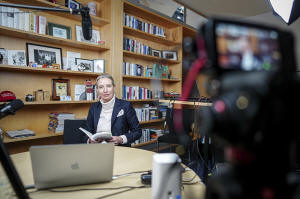Musk uses X livestream to amplify German far-right leader's views ahead
of an election
 Send a link to a friend
Send a link to a friend
 [January 10, 2025]
By VANESSA GERA [January 10, 2025]
By VANESSA GERA
WARSAW, Poland (AP) — Tech billionaire Elon Musk livestreamed his chat
with a leader of Germany's far-right party on Thursday, using the power
of his social media platform, X, to amplify the party's message ahead of
an upcoming national election — and raising concerns across Europe about
the world's richest man trying to influence foreign politics.
Musk, who worked last year to help reelect Donald Trump in the United
States, told Alice Weidel, a co-leader of the Alternative for Germany
party and its candidate for chancellor, that he was “strongly
recommending that people vote for AfD,” using the party's acronym. The
audience for the livestream peaked at more than 200,000 X accounts.
Musk and Weidel agreed that Germany’s taxes are too high, that there is
too much immigration, and that it was a mistake for the country to shut
down nuclear power plants.
Musk said he hoped the conversation showed people that Weidel is
reasonable. “Nothing outrageous has been proposed, just common sense,”
Musk said. “People really need to get behind the AfD, otherwise things
are going to get very, very much worse in Germany.”
The AfD has been put under observation by Germany’s domestic
intelligence agency for suspected extremism, and mainstream parties have
shunned working with it. The AfD has strongly rejected the designation,
portraying it as a political attempt to discredit the party.

Musk and Weidel emphasized the importance of free speech, and Weidel
used the topic as an opportunity to refute the idea that the AfD shares
any affinity with the country’s Nazi past. She said one of Adolf
Hitler’s first acts after seizing power was to restrict speech. She then
emphasized that the AfD holds libertarian views, and contrasted that
with Hitler, who she noted had nationalized Germany’s economy.
“The biggest success after that terrible era in our history was to label
Adolf Hitler as right and conservative. He was exactly the opposite. He
wasn’t a conservative. He wasn’t a libertarian. He was a communist
socialist guy,” Weidel claimed.
The conversation later took a turn away from politics, with Weidel
asking Musk when he thought humans could live on Mars and whether he
believed in God — questions he gave long and inconclusive replies to. "I
am open to the idea of God," he said at one point.
In her concluding remarks, Weidel told Musk that his views are
“visionary.”
Musk has previously used X to endorse AfD, and he authored an opinion
article for the Welt am Sonntag newspaper, claiming Germany under
center-left Chancellor Olaf Scholz is “teetering on the edge of economic
and cultural collapse.” Germany's election is scheduled for Feb. 23.
The foray into politics by the Tesla and SpaceX chief executive is
raising alarm across Europe.

[to top of second column]
|

Alice Weidel, parliamentary group leader, party chairwoman and
candidate for chancellor of the AfD, prepares for a live X interview
with U.S. billionaire Elon Musk in her office in the Jakob Kaiser
House in Berlin, on Thursday, Jan. 9, 2025. (Kay Nietfeld/Pool Photo
via AP)

In addition to endorsing the AfD, Musk has demanded the release of
jailed U.K. anti-Islam extremist Tommy Robinson and called British
Prime Minister Keir Starmer an evil tyrant who should be in prison.
The chat between Musk and Weidel was being monitored by watchdogs
from the European Commission, which has accused X of violating the
27-nation bloc’s sweeping digital rulebook for cleaning up social
media platforms and protecting internet users from online harm.
Commission officials say Musk has the right to express his views but
that the rulebook — known as the Digital Services Act — is designed
to rein in risks that platforms will be misused to amplify illegal
content, including hate speech or election-related misinformation.
The commission has been investigating whether X complies. In
preliminary findings issued last year, Brussels said the platform
was in breach because its blue checkmarks originally intended as
verification badges are deceptive, and because it falls short on
transparency and accountability requirements. Regulators are still
investigating other possible offenses.
Musk presented Weidel as “the leading candidate to run Germany” —
but that isn't true.
Polls show that AfD has grown to be the second-most popular party in
the country. The mainstream conservative Christian Democrats are
favored to win the election, with the latest polling showing them at
31% support, compared with 20% for the AfD.
Still, the AfD has risen in popularity, as have parties with similar
views across Europe, where a former taboo against far-right
viewpoints is in decline.

AfD was formed in 2013 and has moved steadily to the right. Its
platform initially centered on opposition to bailouts for struggling
eurozone members, but its vehement opposition to then-Chancellor
Angela Merkel’s decision to allow in large numbers of refugees and
other migrants in 2015 established the party as a significant
political force.
AfD's support has grown as a result of discontent with Scholz’s
three-party coalition government. It's rising popularity also
reflects a growing frustration among some with Germany’s involvement
with the European Union and NATO which some view as eroding national
sovereignty.
___
AP Business Writer Kelvin Chan in London contributed to this report.
All contents © copyright 2024 Associated Press. All rights reserved |